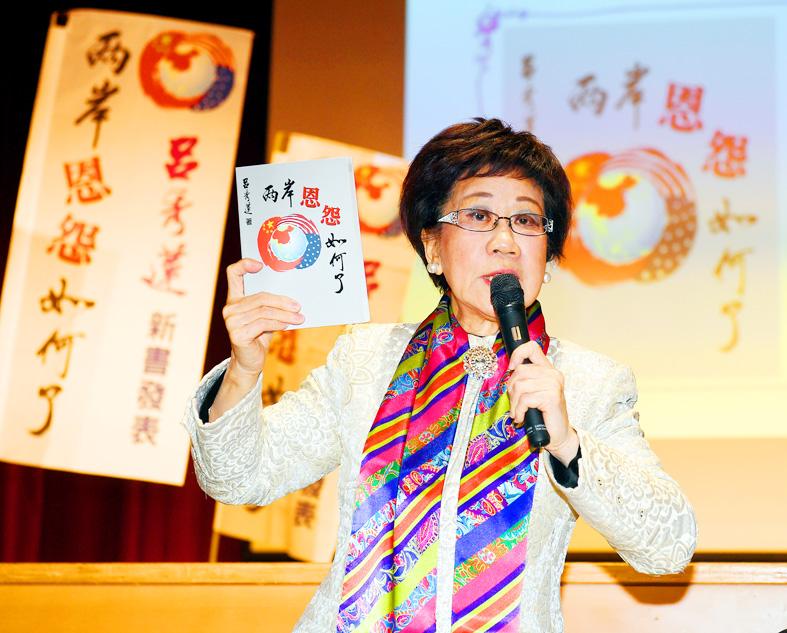Former vice president Annette Lu (呂秀蓮) yesterday suggested breaking the impasse between Taiwan and China by using the phrase “one Chinese” (一個中華), instead of “one China” (一個中國) and “integration” instead of the “unification” of the two sides of the Taiwan Strait.
Ahead of the launch of her new book on how to settle old scores between the two sides of the Strait, Lu introduced a third way beyond unification and independence to deal with cross-strait relations.
She suggested that Beijing change its “one China” principle into a broader “one Chinese” principle, which she said would be more acceptable to Taiwan.

Photo: CNA
Lu also proposed launching discussions on “integration” instead of “unification of the two sides of the Strait,” similar to regional integration programs such as ASEAN, the Community of Latin American and Caribbean States and the EU.
Taiwan should form a “golden triangle” in Northeast Asia by aligning with Japan and South Korea, while inviting Canada and the US to establish a democratic Pacific commonwealth, she said.
In addition to developing relations with China, Taiwan should also work to develop relations with nations around the Pacific Ocean, Lu said.
She expressed hope that her new book would not only provide Taiwan with new perspectives on cross-strait relations, but also give China a chance to reconsider new cross-strait ties.
While Taiwan is considered safe during the COVID-19 pandemic, it is under constant threat of war from China, Lu said, adding that Taiwan should therefore use its soft power for diplomatic purposes.

The Executive Yuan yesterday announced that registration for a one-time universal NT$10,000 cash handout to help people in Taiwan survive US tariffs and inflation would start on Nov. 5, with payouts available as early as Nov. 12. Who is eligible for the handout? Registered Taiwanese nationals are eligible, including those born in Taiwan before April 30 next year with a birth certificate. Non-registered nationals with residence permits, foreign permanent residents and foreign spouses of Taiwanese citizens with residence permits also qualify for the handouts. For people who meet the eligibility requirements, but passed away between yesterday and April 30 next year, surviving family members

The German city of Hamburg on Oct. 14 named a bridge “Kaohsiung-Brucke” after the Taiwanese city of Kaohsiung. The footbridge, formerly known as F566, is to the east of the Speicherstadt, the world’s largest warehouse district, and connects the Dar-es-Salaam-Platz to the Brooktorpromenade near the Port of Hamburg on the Elbe River. Timo Fischer, a Free Democratic Party member of the Hamburg-Mitte District Assembly, in May last year proposed the name change with support from members of the Social Democratic Party and the Christian Democratic Union. Kaohsiung and Hamburg in 1999 inked a sister city agreement, but despite more than a quarter-century of

Taiwanese officials are courting podcasters and influencers aligned with US President Donald Trump as they grow more worried the US leader could undermine Taiwanese interests in talks with China, people familiar with the matter said. Trump has said Taiwan would likely be on the agenda when he is expected to meet Chinese President Xi Jinping (習近平) next week in a bid to resolve persistent trade tensions. China has asked the White House to officially declare it “opposes” Taiwanese independence, Bloomberg reported last month, a concession that would mark a major diplomatic win for Beijing. President William Lai (賴清德) and his top officials

The Ministry of Foreign Affairs (MOFA) yesterday expressed “grave concerns” after Singaporean Prime Minister Lawrence Wong (黃循財) reiterated the city-state’s opposition to “Taiwanese independence” during a meeting with Chinese Premier Li Qiang (李強). In Singapore on Saturday, Wong and Li discussed cross-strait developments, the Singaporean Ministry of Foreign Affairs said in a statement. “Prime Minister Wong reiterated that Singapore has a clear and consistent ‘one China’ policy and is opposed to Taiwan independence,” it said. MOFA responded that it is an objective fact and a common understanding shared by many that the Republic of China (ROC) is an independent, sovereign nation, with world-leading